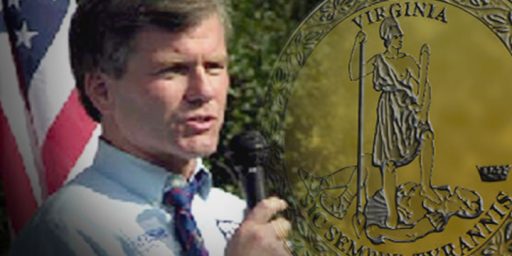Scandals Heighten Public Concerns about Corruption
Jeff Birnbaum has a front page op-ed in today’s Washington Post about the evils of money in politics.
A Growing Wariness About Money in Politics
For several years now, corporations and other wealthy interests have made ever-larger campaign contributions, gifts and sponsored trips part of the culture of Capitol Hill. But now, with fresh guilty pleas by a lawmaker and a public relations executive, federal prosecutors — and perhaps average voters — may be concluding that the commingling of money and politics has gone too far. After years in which big-dollar dealings have come to dominate the interaction between lobbyists and lawmakers, both sides are now facing what could be a wave of prosecutions in the courts and an uprising at the ballot box. Extreme examples of the new business-as-usual are no longer tolerated.
Republicans, who control the White House and Congress, are most vulnerable to this wave. But pollsters say that voters think less of both political parties the more prominent the issue of corruption in Washington becomes, and that incumbents generally could feel the heat of citizen outrage if the two latest guilty pleas multiply in coming months.
No fewer than seven lawmakers, including a Democrat, have been indicted, have pleaded guilty or are under investigation for improper conduct such as conspiracy, securities fraud and improper campaign donations. Congress’s approval ratings have fallen off the table, in some measure because of headlines about these scandals. “The indictments and the investigations have strengthened the feeling that people have that in fact there’s too much money in Washington and that the money is being used to influence official decisions,” said William McInturff, a Republican pollster with Public Opinion Strategies. “Polls show that neither party is held in high regard.”
The latest court case came yesterday in San Diego when Rep. Randy “Duke” Cunningham (R-Calif.) wept openly after pleading guilty to tax evasion and conspiracy. His plea bargain came less than a week after public relations executive Michael Scanlon coolly admitted his role in a conspiracy to try to bribe a congressman. Members of Congress, lawyers and pollsters recognize that both events taken together could signal the start of a cyclical ritual in the nation’s capital: the moment when lawmakers and outsiders are widely seen as getting too cozy with each other and face a public backlash — and legal repercussions — as a result.
[…]
Yet the activities under scrutiny can also be viewed as logical extensions of actions that once were rare but over time have become commonplace: massive political fundraising, freewheeling private travel given to lawmakers by groups interested in legislation, and the bestowing of other gifts and benefits on government officials by lobbyists. As the Scanlon case demonstrates, the extent of this favor-buying has gone so far that the Justice Department is no longer deterred from bringing charges even if the gifts fall within Congress’s gift-giving limits or are below campaign finance maximums. “It doesn’t matter,” Brand said. Charges could come, he said, if “anything of value is given to a public official that can be linked to an official act.” Scanlon was a partner of lobbyist Jack Abramoff, and they are under investigation for allegedly improperly extracting $82 million from Indian tribes. Scanlon has agreed to return $19 million and is cooperating with authorities, who have broadened their inquiries to include at least half a dozen lawmakers, some lawmakers’ spouses and several aides-turned-lobbyists, lawyers involved in the case have said.
[…]
At least partly because of public reports of these inquiries, voters’ feelings about Congress have turned upside down since the start of 2001. In January 2001, 59 percent of Americans approved of the way Congress was doing its job and 34 percent disapproved, according a Washington Post-ABC survey. Earlier this month, the same poll showed that 37 percent approved and 59 percent disapproved. In addition, for the first time in its 15-year history, the Wall Street Journal-NBC poll this year showed that the public’s negative feelings exceeded its positive feelings about both political parties at the same time. “These are cautionary notes that are affecting both parties’ political standing,” McInturff said.
Birnbaum’s analysis is likely right, although it is not really news worthy of front page treatment. Further, without the internals of the polling, the connection between recent scandals and the lowered poll numbers of Congress are far from clear. Indeed, I suspect the drop has far more to do with partisan grandstanding and constant bickering among the leadership than it does with the Scanlon and Cunningham scandals.
The irony is that people already have a general sense that politicians are corrupt, despite very little evidence. There are 535 Members at any given time, with only a handful even under direct suspicion. Indeed, most Members could retire and instantaneously increase their earning power severalfold.
Aggressive prosecution of corruption cases is a good thing. Even better would be an internal climate on Capitol Hill that would shun the likes of Cunningham once the facts of the matter become evident. Beyond that, though, I fear a general backlash against “money” in politics. Given that campaigning for office is expensive, measures to rein in spending will only redound to the benefit of incumbents.
Full disclosure: My wife is an executive at McInturff’s firm.





Face it; Had a Republican not been removed, it wouldn’t be on the front page. If this had been a Democrat, it’d be on A-39 below the fold.
To be fair about it, perhaps that’s because Demorats bveing corrupt really isn’t news anymore.
Correct me if I’m wrong, but the last member to get in trouble like this was Ohio Democrat James Trafficant. That was front page news.
And your last sentence just seems stupid in light of Delay, Frist, Blunt father, Blunt son and Bob Taft. Corruption is in both parties. I think most people have accepted that.
Corruption does indeed riddle both parties. And we put up with it. Shame on us.